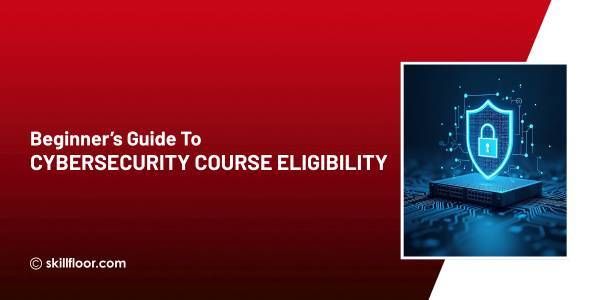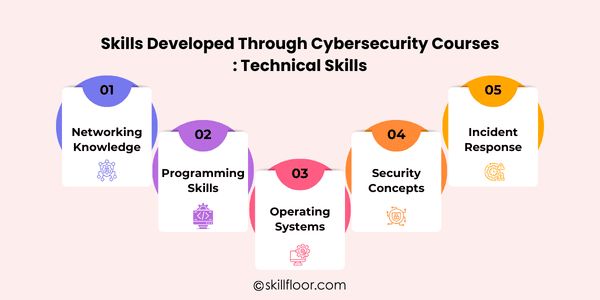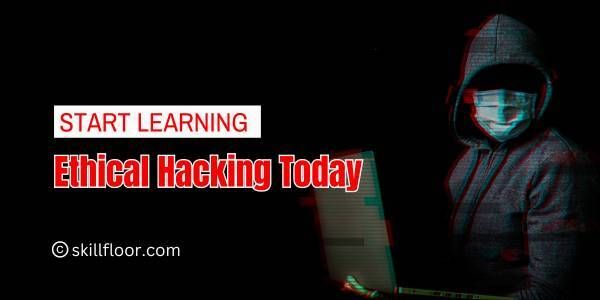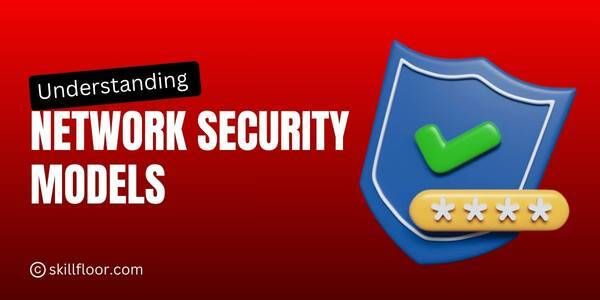Cybersecurity Course Eligibility: Your Path to a Secure Future
Unlock your cybersecurity career today! Learn about course eligibility, essential skills, and the roadmap to a secure, high-demand, future-ready career in tech.

Don't miss out on one of the professions with the fastest rate of growth! Given the frequency of cyberattacks and data breaches in today's environment, cybersecurity is no longer merely an IT profession. Everywhere, businesses want qualified experts to safeguard their systems. Prior to beginning, it's critical to comprehend the prerequisites for cybersecurity courses and how they will help you advance your career.
Why Cybersecurity Matters More Than Ever
The digital world is expanding at an unprecedented rate. The annual costs associated with cybercrime are projected to rise from ₹249 trillion in 2015 to ₹871.5 trillion by 2025. As a result, cybersecurity skills are increasingly important for both individuals and businesses, as every system, application, and online transaction is at risk.
This escalating threat serves as a warning to companies. There is a pressing demand for experts who can identify, prevent, and manage cyberattacks while safeguarding sensitive digital assets. For those aspiring to enter this field, there is a fantastic opportunity to pursue a highly sought-after career that combines strategy, technology, and problem-solving in a rewarding way.
The truth is that supply cannot keep up with the rising demand. By 2026, it is anticipated that there will be a 3.5-million-person shortage in cybersecurity worldwide, according to (ISC)2. Qualified individuals who are prepared to make an impact are needed for millions of positions in IT risk management, ethical hacking, and security analysis.
The Confusion Around Cybersecurity Course Eligibility
The hardest thing for aspiring cybersecurity experts to overcome is not the difficulty of the work itself, but rather determining if they are qualified to begin.
You might be thinking:
“Do I need a computer science degree?”
“Do I need years of IT experience?”
“What if I’m just starting out with basic tech knowledge?”
The truth is that cybersecurity is easier to obtain than you may imagine. There are courses for everyone, from total beginners to seasoned IT specialists. However, knowing your eligibility can help you avoid months of trial and error.
Developing cybersecurity skills over time can help you stand out, even if you're just getting started. You may learn efficiently through modest projects, practical experience, and hands-on laboratories. This will boost your confidence and credibility as you go to more complex courses and certifications.
Who Can Pursue a Cybersecurity Course?
1. Beginners: You Don’t Need to Be a Tech Wizard
Do you believe that cybersecurity is only for IT graduates or coding whiz? Rethink your thoughts. Many introductory courses accept:
-
High school graduates or anyone with basic computer literacy
-
Professionals from non-tech backgrounds seeking a career change
-
Students exploring career options in IT and security
These courses focus on foundational skills, like:
-
Basic networking concepts
-
Understanding cyber threats and attacks
-
Safe computing practices
Example: After completing a six-month introductory cybersecurity course, a marketing professional with no previous IT experience moved into an analyst position at a tech company, earning 40% more than they had before.
2. Intermediate Learners: Strengthen Your Tech Foundation
You can advance if you are already familiar with computers and networks by taking intermediate courses. Commonly eligible individuals include:
-
A college degree in IT, computer science, or related fields
-
Basic understanding of operating systems, networking, and databases
-
Curiosity to explore penetration testing, ethical hacking, or incident response
It's critical to understand cybersecurity course eligibility at this point. It makes sure that the course you choose fits your existing knowledge and pushes you to effectively increase your technical proficiency.
Pro tip: You can learn by doing many intermediate courses, which is a crucial step in developing practical cybersecurity abilities. The goals of advanced learning are also perfectly aligned with this pragmatic approach.
3. Advanced Professionals: Specialize and Certify
Courses for people pursuing high-level positions, such as cyber threat analyst, penetration tester, or security consultant, frequently call for:
-
Relevant IT experience (2–5 years in networking, system admin, or IT support)
-
Understanding of programming languages like Python, Java, or C++
-
Familiarity with security protocols, firewalls, and intrusion detection systems
Advanced courses also prepare you for globally recognized certifications like:
-
CISSP (Certified Information Systems Security Professional)
-
CEH (Certified Ethical Hacker)
-
CompTIA Security+
Before enrolling in these advanced programs, you may save time and effort by determining your cybersecurity course eligibility. This will guarantee that you satisfy the requirements and are ready to obtain certifications that provide access to elite organizations, which frequently provide wages two to three times more than entry-level positions.
Educational Background Requirements
Although many people can access cybersecurity, the requirements for each course differ:
1. Entry-Level Courses
Students with a high school degree or basic computer skills can apply for many starting certifications, including CompTIA Security+, Certified Ethical Hacker (CEH) Foundation, and Certified Ethical Hacking Professional (CEHP). These courses offer a strong foundation in networking, security concepts, and the fundamentals of ethical hacking, making them perfect for individuals who are just beginning their cybersecurity adventure.
2. Advanced Courses
A bachelor's degree in computer science, information technology, or a similar discipline is normally required for programs like CISSP, CISM, or OSCP, in addition to some professional job experience. These courses are intended for people who wish to progress into specialized or leadership roles and who already possess a strong understanding of cybersecurity principles.
3. Alternative Paths
Fundamental classes or practical training are frequently ways for self-taught students or diploma holders to get started in the profession. These students can develop strong skills and pursue successful jobs without a formal degree if they get committed, gain real-world experience, and acquire certifications.
Prerequisite skills that make learning smoother include basic networking, operating system knowledge, and familiarity with programming concepts.
Types of Cybersecurity Courses & Eligibility
The courses offered are tailored to various learning levels, since cybersecurity is a broad topic. You can select courses based on your educational background, professional objectives, and experience. Here's a summary:
1. Entry-Level Certifications
Examples: CompTIA Security+, CEH Foundation
Who can take them: Beginners with only a high school education or basic IT skills. These courses are perfect for people who are just beginning their cybersecurity adventure because they don't require advanced experience.
What you learn:
-
Basics of network security (how networks are protected from attacks)
-
Introduction to ethical hacking (learning to think like a hacker to protect systems)
-
Understanding risk assessment (identifying potential threats and weaknesses in a system)
Purpose: These courses build a strong foundation in cybersecurity and prepare you for beginner-level roles like security analyst or IT support with a security focus.
2. Advanced Certifications
Examples: CISSP, CISM, OSCP
Who can take them: Professionals with two to five years of experience working in cybersecurity or IT and a bachelor's degree in computer science, information technology, or a similar discipline.
What you learn:
-
Security management (how to plan and oversee security strategies for an organization)
-
Advanced penetration testing (testing systems to find vulnerabilities before hackers do)
-
Governance and compliance (making sure security measures meet legal and organizational standards)
Purpose: These courses are for professionals looking to move into senior, specialized, or leadership roles in cybersecurity.
3. Specialized Courses
Examples: Cloud Security, Application Security, Digital Forensics
Who can take them: Learners with prior IT or cybersecurity knowledge. These courses focus on a specific niche within cybersecurity.
What you learn:
-
Cloud Security: Protecting data and applications in cloud environments
-
Application Security: Securing software and apps from vulnerabilities
-
Digital Forensics: Investigating cyber crimes and tracking digital evidence
Purpose: Specialized courses allow professionals to focus on a niche area, making them experts in a specific field of cybersecurity.
Choosing the right course depends on your current education, experience, and career goals.
Skills Developed Through Cybersecurity Courses
A cybersecurity course doesn’t just teach theory; it equips you with tangible skills:
1. Technical Skills
Pursuing a cybersecurity course requires certain technological capabilities in addition to educational credentials. These abilities show that you are capable of using the tools and technology that are frequently utilized in the field. Among the essential technical abilities are:
-
Networking Knowledge
-
Programming Skills
-
Operating Systems
-
Security Concepts
-
Incident Response

You can use the tools and technology frequently used in cybersecurity with these abilities. Even if you are just starting, the majority of courses contain practical tasks to help you develop a solid foundation.
2. Tools & Technologies
-
Firewalls
-
SIEM (Security Information and Event Management)
-
IDS/IPS (Intrusion Detection/Prevention Systems)
-
Penetration Testing Tools
-
Vulnerability Assessment Tools
3. Soft Skills & Personal Qualities
-
Analytical Thinking
-
Problem-Solving
-
Risk Assessment
-
Attention to Detail
-
Ethical Mindset
-
Continuous Learning
For anyone considering cybersecurity course eligibility and preparing for a successful career in the industry, cultivating these traits is crucial since it improves decision-making, helps you see dangers, and keeps you flexible.
Career Paths After Completing Cybersecurity Courses
Cybersecurity opens up multiple career paths, such as:
-
Security Analyst: Monitor and protect organizational networks.
-
Penetration Tester: Test systems for vulnerabilities.
-
Cybersecurity Consultant: Advise businesses on security strategies.
-
SOC Analyst: Work in Security Operations Centers, managing threats in real time.
-
Incident Response Specialist: Respond to security breaches and coordinate recovery efforts.
-
Security Architect: Design and implement secure IT systems and infrastructure.
The need for qualified workers is rising quickly because of the ever-changing nature of cyberthreats, and these specialists frequently offer competitive pay and chances for advancement.
Tips to Choose the Right Cybersecurity Course
When selecting a course, consider:
-
Accreditation: Select programs or institutions that are well-known in the field.
-
Hands-On Practice: Simulations and labs are essential for practical skills.
-
Flexibility: Options for online vs in-person learning, length of course, and price.
-
Career Support: Resources for ongoing education, mentorship, and placement support.
-
Updated Curriculum: Make sure the most recent developments in cybersecurity are covered in the course.
-
Instructor Expertise: Learning quality is improved by knowledgeable lecturers with experience in the field.
Enhance Your Eligibility Before Enrolling
Before enrolling in a course, think about doing the following to maximize your learning and increase your chances of success:
-
Gain Relevant Experience: Practical skills are developed through internships, part-time IT jobs, or side projects.
-
Obtain Foundational Certifications: Your profile might be strengthened by obtaining beginner certifications like CEH Foundation or CompTIA Security+.
-
Understand Industry Requirements: Explore the abilities and expertise required for your desired position or industry.
-
Hands-On Practice: Complete labs, small projects, or Capture the Flag (CTF) activities.
-
Stay Current: To stay informed about new technologies and risks in cybersecurity, follow online communities, webinars, forums, and news.
-
Network with Professionals: Make connections with alumni, online groups, and cybersecurity specialists to obtain industry insights, mentorship, and advice.
Additionally, you may stay current on tools, trends, and new risks by utilizing online communities and resources like Coursera, Udemy, edX, Skillfloor, forums, and webinars.
Challenges in Cybersecurity Learning & How to Overcome Them
The technical complexity and dynamic nature of cybersecurity can make it difficult. Common obstacles consist of:
-
Steep Learning Curve: Take core classes first, then work your way up to more complex subjects.
-
Keeping Up with Threats: Keep up with cybersecurity news, forums, and updates on a regular basis.
-
Practical Experience: Create labs, take part in internships, and capture-the-flag (CTF) activities.
-
Time Management: Make a set timetable because it can be challenging to balance studying with work or school.
-
Complex Tools & Technologies: Focus on one subject at a time; learning several tools and platforms might be overwhelming.
-
Certification Pressure: Exam preparation can be stressful, but it can be managed with regular practice and the use of study aids.
Overcoming these challenges requires perseverance and curiosity, which will keep you inspired, enable you to keep learning, and help you build the abilities required to be successful in cybersecurity.
Learning technical skills is only one aspect of entering the cybersecurity field; another is developing a career that adapts to the ever-changing digital landscape. You can make the best decision, build your confidence, and begin acquiring useful skills by knowing your cybersecurity course eligibility. Every action you take, regardless of your level of experience, gets you closer to safeguarding people, data, and systems. Consistently take little steps, experiment with practical projects, and maintain your curiosity. The road is wonderful, and the opportunities are limitless. Being aware of your eligibility now can have a significant impact on creating a stable and secure future.































































